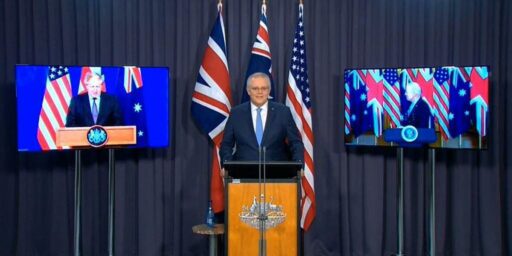Australian Court Overturns Same Sex Marriage in Capital
Via the BBC: Australia high court overturns ACT gay marriage law
Australia’s High Court has overturned legislation allowing gay marriage in the Australian Capital Territory (ACT).
The ACT parliament passed a bill in October making the territory the first part of Australia to legalise same-sex weddings.
But the national government challenged the decision, saying it was inconsistent with federal laws.
Some 27 couples who married since the law came into effect last weekend will now have their unions declared invalid.
The court said the issue should be decided by parliament – which in September 2012 voted down gay marriage legislation.
The article notes that federal law “specified in 2004 that marriage was between a man and a woman,” and “Civil unions are allowed in some states in Australia.”
As such, as with the US, the issue of gay marriage is being played out as a conflict between various levels of government. The ACT is like the District of Columbia,
Just as a comparative note, we see here that the US is not the only federal system in the world (indeed, there are a significant number of them). And because it comes up with some frequency in comments and other places, note that Australia is federal and has a parliamentary system (I note this because some people seem to have the idea that federalism is inherently linked to other American institutional elements). And while I am on the topic of comparative politics, many people also confuse and conflate the notions of the US being a republic with the fact that has federalism. However, Australia (like Canada), are part of the commonwealth, and their head of state is Queen Elizabeth II, making them constitutional monarchies (and not republics in the sense of having no monarch). Australia is, like the US, a representative democracy, however (which is, as I constantly note, really all Madison meant by a “republic” to begin with).






Good thing they “specified” that 9 years ago, huh? It’s almost like they saw this coming…….
Note that Austalia’s federal law goes farther than US DOMA. Also, apparently (I ave not verified) the Australian constitution limits marriage policy to the federal government. So the ACT legislation probably never stood a chance. The High Court vote was 6-0.
Also Important here: the Labor government of Julia Gillard allowed a free vote–meaning the leadership did not whip its caucus as it normally would in a parliamentary system– in 2012. (Gillard herself was agaist legalizing same-sex marriage.) The liberalization proposal was defeated badly, in part because the Liberals (which are actually conservative) did whip their caucus–against liberalization. The current (since Sept 2013) Liberal PM Abbot is also against liberalization, but might be persuaded to allow another free vote. (Aside: his sister is lesbian and was engaged to be married in Canberra when this ruling came.) In such a case it would almost certainly pass.
Bottom line: unlike in the USA, in Australia same-sex marriage, when it happens, will come not via states or court action, but via uniform federal legislation.
@MSS: The wonderful Constitute site confirms your recollection: